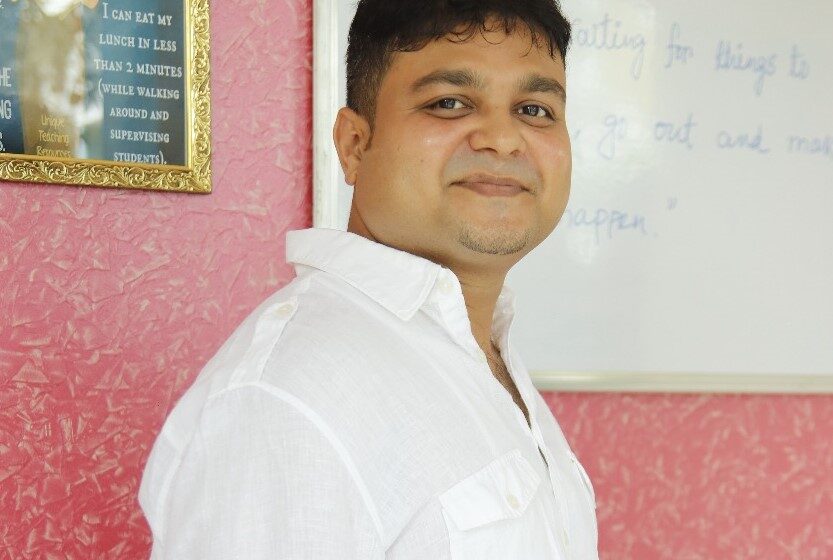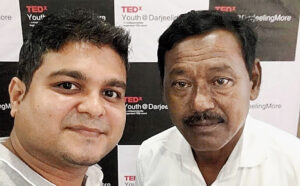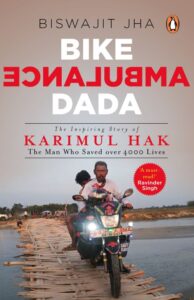You can be ordinary and still do outstanding work

Former journalist-turned-social entrepreneur BISWAJIT JHA talks to SAURABH TANKHA about what made him choose tea garden labourer Karimul Hak as the protagonist for his debut novel, Bike Ambulance Dada (Penguin Random House India).
When did it occur to you that the story of Karimul Hak should reach out to people in the form of a book? And how did you go about it?
In 2015 when I heard about Karimul Hak and his work from a friend of mine, I felt an urge to meet this person. One day, I went on to meet him in his village much before he received Padma Shri and much before he became a well-known figure. But I, at once, got hooked to this simple man who did such great work. What amazed me was that despite being a tea garden labourer, he did such an incredible work to help his fellow villagers without thinking much about his own family. After that I started working with him to serve the poor. I made him the brand ambassador of my school which I started in Cooch Behar in 2017.
I felt people all over the world should know the story of Karimul Hak which is a living proof that you don’t have to be an extraordinary person to do extraordinary work. You can be ordinary and still do outstanding work for people. His life is an inspiration for all of us. When a tea garden labourer with a meagre monthly salary can undertake such a pathbreaking journey, we all are capable of doing wonders.
I began by talking to him, his family members, his close associates, his fellow villagers and other people who knew him well. I also read many newspaper reports about his work and him in the last 10 years. Finally, satisfied with my research on Karimul, that I started writing about the man whom I consider a living legend.
It was a tremendous experience getting to know him even closely. To be in contact with a man like him is an honour and a privilege. Working with him was a huge joy and an equally great learning experience. Talking to him and watching him was enriching. You are sure to be moved by this great man when you listen to his stories of serving the poor, his vision and his secular nature.
What made you switch professions, from a journalist to a social entrepreneur?
Like Karimul, I was also born and brought up in a humble family of a small village in Jalpaiguri district of West Bengal. I struggled my way to become a national level journalist. I hardly got any support when I grew up. But I wanted that no one should face the same ordeal which I faced in childhood. With this thought in mind, my wife both and I quit our jobs and well-settled life in Delhi to return to the northern region of West Bengal, considered to be the backward area of the state. After that we started serving the poor and helpless people. I basically wanted to be a part of the difficult but successful stories of many struggling men like Karimul.
How satisfying has the change been and what changes have you experienced in yourself after this switch?
Initially, it was very challenging. To start everything all over again was tough. I had sleepless nights but I kept on doing for the others in my tough days. That, I think, helped me overcome my personal troubles. When I found there were thousands of people who did not have food, clothes and shelter, my problems seemed much lesser as compared to them.
While working for others, I became a much better person. I found my true meaning of life. I felt happy within. And when you start to feel happy within, everything around you becomes beautiful. That’s why in my second book, which is a fiction, I have written that the only way to get happiness is to serve others unconditionally.
You have known Karimul for years. What is that one quality in him which most of us don’t have?
To give everything to accomplish a mission. Despite being a tea garden labourer, he gave his life to carry critically ill patients to the hospitals free of cost so that nobody died like his mother without treatment.
How different are you from other authors?
(Laughs) This is my first book. So I am eagerly waiting to get feedback from the readers what they think about me as an author. But yes, my genre is definitely inspirational stories. The two books (one non-fiction and one fiction) I have written so far, both are motivational books. Through my writing I want people to find true meaning of life and live a happy and peaceful life.
What if your creative work doesn’t get good reviews (honest confession)?
I am okay with that. I would rather take a deep breath, sit down peacefully and then start writing another book (laughs). On a serious note, I would see the negative reviews positively and try to work on my writing. I always push myself to be better. Writing is a process. I would try to improve myself till the last day of my life.
In your opinion, what is that one thing which is the most important part of a book?
A book should show readers some hope. At the end of the day, it is hope which keeps us going in life despite many hiccups and failures.
Is writing energising or exhausting?
Both. Writing a book is very challenging. Sometimes it’s a very lonely job as it takes a lot out of you. So, sometimes, it is very energising and sometimes, very exhausting. But I feel emotionally charged-up as a storyteller. In the two books I have written so far, I cried numerous times while writing emotional scenes.
Share something about your family…
My father, from whom I got my first lesson to serve society, was a primary school teacher and has always led a simple and honest life. After coming back from Delhi, I have started living a very unique life – half with my parents in my native village and half with my father-in-law who is a doctor and a widower. Due to his medical profession, he lives alone in a different town. My wife, along with my eight-year-son Zico, also keeps dividing her time with me and takes care of both of our parents. I’m very lucky that I have got support to carry out every ‘adventure’ in my life from every one of my family.



